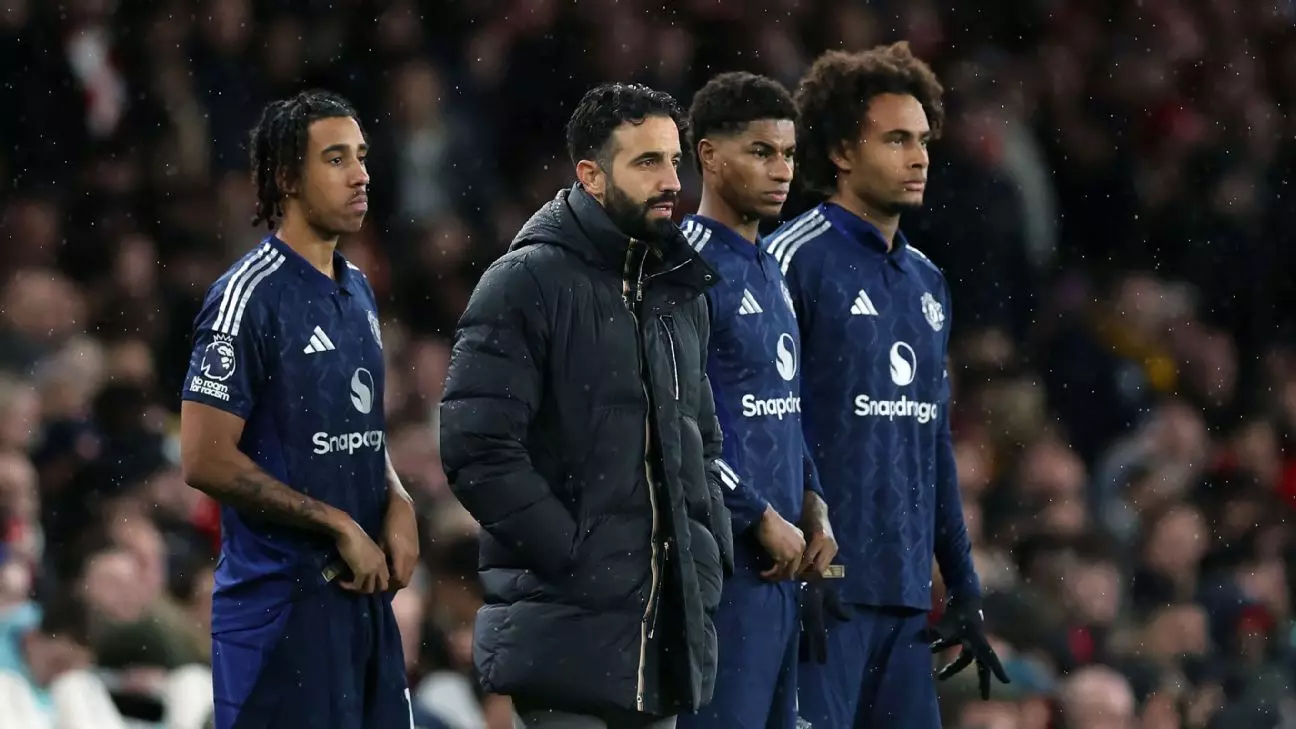Ruben Amorim’s tenure as the head coach of Manchester United has been punctuated by significant challenges, most notably the persistent issue of player injuries. Following his recent 2-0 defeat against Arsenal, Amorim expressed the constraints imposed by having to work with players still recovering from injuries and the accompanying limitations on their game time. This match marked a turning point, as it represented his first official league loss in over a year, a striking contrast to his previous achievements in Portugal with Sporting CP.
The match at the Emirates Stadium saw second-half goals from Jurriën Timber and William Saliba, both stemming from set pieces, highlighting a vulnerability in United’s defensive organization—an area that Amorim has prioritized since his appointment. However, the critical takeaway from this defeat extends beyond the scoreline; it centers on the ongoing struggles with player fitness that have become a recurring theme in Amorim’s managerial narrative.
Amorim’s comments following the match reveal the extent to which injuries have affected his selection strategy. Key players like Harry Maguire, Tyrell Malacia, and Mason Mount are still reintegrating into match scenarios, being carefully managed to avoid exacerbation of their conditions. This careful management not only influences individual playing time but also directly impacts the team’s tactical setup, pressing strategy, and overall performance cohesion.
“With players on time limits,” Amorim noted, “we have to adopt a different methodology during games.” The pressure of accommodating player fitness levels has necessitated a more fluid tactical approach, where substitutions and adjustments become essential in real-time. This dynamic is particularly observed in high-stakes matches like the clash with Arsenal, where the loss of momentum due to player fatigue proved detrimental.
Despite the setback against Arsenal, Amorim remains optimistic, emphasizing the importance of evaluating player performance independent of results. He acknowledged that there were elements to learn from, even in defeat. “I make the evaluation of the game regardless of the result,” he asserted, demonstrating a level-headed approach. This resilience is crucial, as cultivating a growth mindset among players is vital for long-term success, particularly when navigating through challenging periods.
Moreover, Amorim’s acknowledgment of the atmosphere at the Emirates Stadium reflects a deep understanding of player psychology and momentum in football. The coach recognized the shifts in energy during the game, particularly at critical junctures — a factor that can influence decision-making and performance on the pitch. Such insights underline the complexities of management that extend beyond tactics, encompassing emotional and psychological dimensions.
Another focal point of Amorim’s challenges is the case of Luke Shaw, whose ongoing injury saga adds another layer of complexity. Shaw’s commitment to rehabilitation, evidenced by consistent effort in both gym and field work, is commendable and speaks volumes about his character as a professional athlete. Amorim’s remarks regarding Shaw indicate a supportive coaching philosophy, emphasizing patience in player recovery processes, which is essential for both the individual’s wellbeing and the team’s long-term stability.
“I’m with him, we will help him to return,” Amorim stated, highlighting his commitment to the player’s long-term health over immediate performance. This approach can foster trust and loyalty within the squad, an essential component for building a resilient team culture.
Ruben Amorim faces a multifaceted challenge at Manchester United, where managing injuries becomes as significant as devising tactics for success on the pitch. The pressure of driving results while accounting for player fitness showcases the tightrope he must walk as a head coach. As he strives to balance immediate performance with long-term squad health, the recent defeat serves as both a lesson and a catalyst for growth. Under his guidance, the journey may be fraught with challenges, yet it also holds the potential for refinement and resilience, essential traits for any team aspiring to reclaim its glory.

